According to the magnetic difference of various ores or materials, the crude ore or materials realize the final mineral separation under the magnetic force and other mechanical forces. Based on 20 years of mineral processing experience, Xinhai continuously develop and innovate magnetic separation process on the basis of the traditional magnetic separation method, and has developed dry and wet magnetic separator. All magnetic system adopts NdFeB and warp angle design, which not only improves the magnetic field intensity, but also increases magnetic turn degree, increases 30% mineral separation efficiency; Therefore, Xinhai won a number of patents, and now has formed complete Xinhai magnetic separation process system.
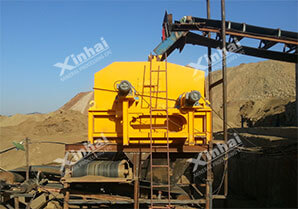
Aiming at the characteristics of magnetic strength, Xinhai introduced different magnetic separation processes to process minerals with different magnetic strength.
Weak magnetic field magnetic separation process is mainly used to recover strong magnetic minerals. Strong magnetic field magnetic separation process is used to recover weak magnetic minerals.
After the pulp enters magnetic separator, magnetic force received by magnetic particle is more than mechanical force from the opposite direction, magnetic particle is attached to the cylinder and then brought to discharge outlet.
Magnetite, titanomagnetite and pyrrhotite;
After the pulp enters magnetic separator, magnetic force received by magnetic particle is less than mechanical force from the opposite direction, so magnetic particle remains in magnetic separator.
Hematite, specularite, siderite, limonite, manganese ore and wolframite
Nonmagnetic ore mainly adopts anti-magnetic separation, nonmagnetic ore receives small magnetic field, and remains in pulp then discharges.
Wolframite, quartz, feldspar, galena, gold and fluorite.
Ore Property: After the mineral processing test, Xinhai Mine Research Institute concluded that the main metallic mineral were titanomagnetite, ilmenite and a small amount of hematite, limonite and secondary magnetite. The gangue mineral was plagioclase.
Plant Problem: Xinhai laboratory found that the content and grade of titanium magnetite change significantly with ore grade, and was gradually reduced, the grade was thinner, mostly were 0.5~1.5mm. limonite were granular, crystalline and irregular form.
Xinhai Solution: After mineral processing test, Xinhai decided to use three opening crushing, one roughing, one concentration, and one scavenging magnetic separation process. After the crushing and grinding, the grinding minerals returned to the classifier, which formed a closed cycle, the coarse grain was returned to the closed cycle, the fine grain returned to the original work. Then Xinhai adopted magnetic separator for one roughing, one concentration, and one scavenging , and finally obtained qualified iron concentrate.
Process Indicator: Ore grade: 31.3%; Concentrate grade: 63%; Recovery rate: 84.85%
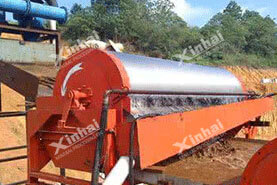
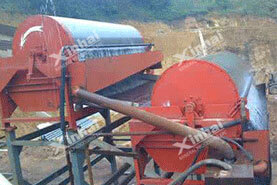
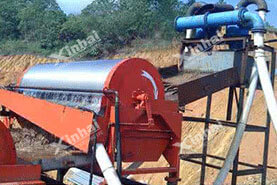
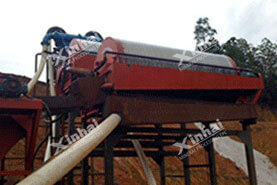
Ore Property: The samples were collected by customer and sent to Xinhai. After the sample test, Xinhai found valuable mineral were mainly iron minerals, including hematite, martite and magnetite, as well as a small amount of limonite, specularite. Gangue mineral was mainly quartz.
Project Problem: According to the ore dressing test, Xinhai found that the grain size was not uniform. The maximum particle size of iron ore was over 1mm, and the minimum particle size was 0.005mm. The particle size of iron ore in quartz was 0.003~0.035 mm.
Xinhai Solution: The plant originally used weak magnetic-strong magnetic separation process. The production practice showed that this process failed to obtain final qualified concentrate and the recovery rate was low. Therefore, Xinhai decided to carry out technical renovation, adopted gravity separation-magnetic separation-floating stage grinding process.After roughing, concentration, scavenging of gravity separation, classification product entered into the weak magnetic separation, magnetism magnetic separation and strong magnetic separation. After three final concentration flotation, iron concentrate was obtained. The process not only improved the grade of iron concentrate, but also reduced the consumption of electricity, steel ball and liner, the production indexes were improved greatly.
Process Indicator: Ore grade: 28.6%; Concentrate grade: 60.6%; Recovery rate: 69.96%
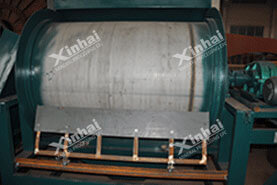
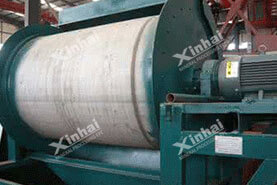
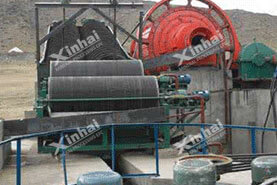
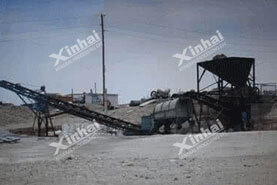
Ore Property: Fujian customers collected 50kg ore samples at the site, then commissioned Xinhai to conduct the ore property test, then Xinhai concluded that the ore mainly included hard manganese ore, soft manganese ore and manganese soil. The gangue mineral were mainly quartz, kaolin and sericite.
Project Problem: After the ore chemical property test, Xinhai laboratory found that the hard manganese ore and soft manganese ore were ring structure and close symbiosis. The hard manganese ore was compact massive, gelatinous or granular; the soft manganese was oxidation residual or lump. Manganese was very loose and had low grade.
Xinhai Solution: Aiming at the symbiosis of manganese ore, Xinhai adopted two stage one closed crushing, one stage grinding, and gravity separation-magnetic separation process. After the grinding and classification, coarse grain products entered into Xinhai jig for separating, fine grain was sent into Xinhai magnetic separator for stong magnetic separation, and then qualified manganese ore concentrate and tailings were obtained.
Process Indicator: Ore grade: 28.29%; Concentrate grade: 82.03%; Recovery rate: 68.69%
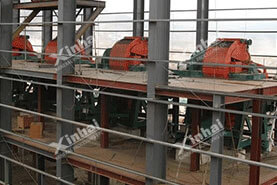
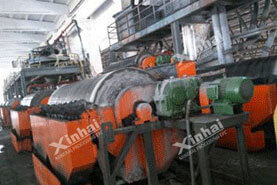
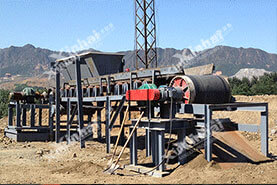
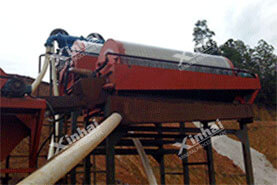
If you have any questions, please contact us by the following ways, and we will provide you with better help!
Xinhai specially set up Mineral Research Institute and Magnetic Separation Department, more than 200 magnetic professionals provide technical support for the mineral processing service. Since established 20 years, Xinhai has been committed to the development and innovation of magnetic separation process and equipment, has obtained a number of national invention patents.
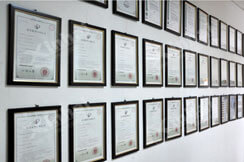

"Create a global brand, based on global gold markets " has been one of the strategic thought of Xinhai, depending on its professional gold processing service, Xinhai has got the EU certification, and ISO9001:2008 quality management system certification as early as in 2008, Xinhai is classified as the assured brand with advanced products and standard quality!
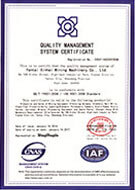
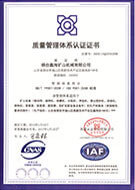
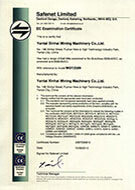
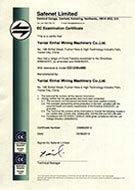
To find out more about our products and solutions, please fill out the form below and one of our experts will get back to you shortly.